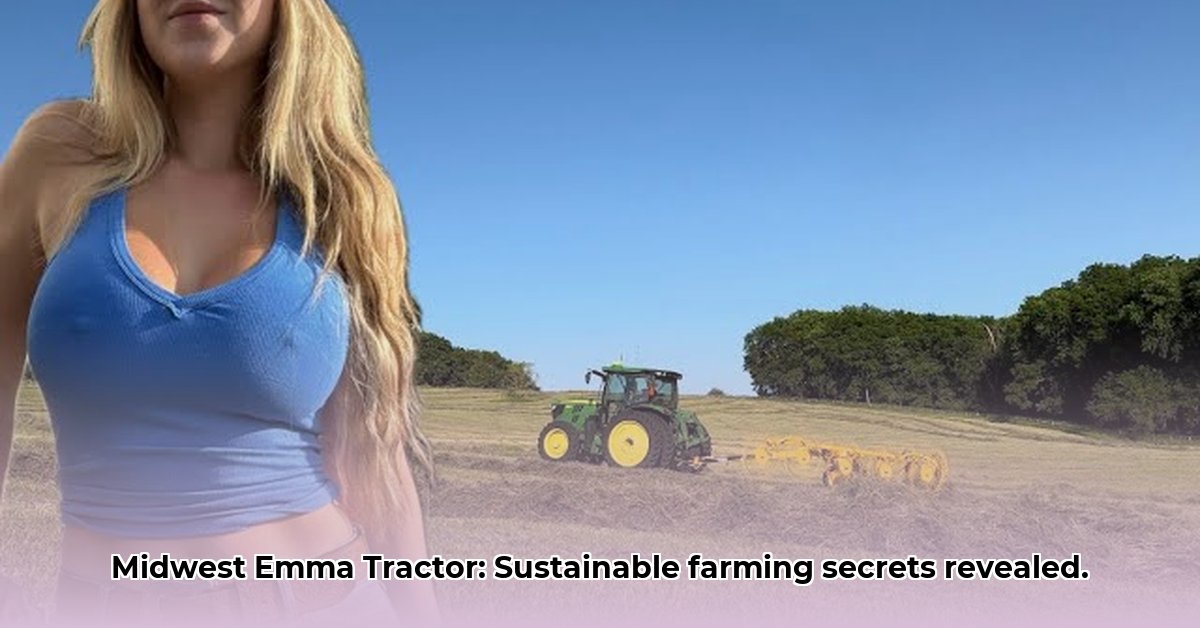
From Tradition to Transformation: A Midwest Farmer's Sustainable Revolution
Emma, a fifth-generation farmer from the Midwest, represents a new wave in agriculture. Her journey, meticulously documented on YouTube and Instagram, showcases a compelling transition from traditional farming methods to a sustainable approach that prioritizes soil health, environmental stewardship, and community building. This isn't just a story about farming; it's a testament to the power of innovation, resilience, and a deep connection to the land. Her trusty tractor, a constant companion in her online chronicles, plays a pivotal role in this transformation. For tractor maintenance tips, check out this helpful resource: Tractor maintenance.
What initially began as experimentation has blossomed into a thriving operation, proving that sustainable farming practices aren't just environmentally beneficial but can also be economically viable. But how does she achieve this balance? And what lessons can others glean from her experience?
Key Takeaways from Emma's Journey:
- Soil Health as a Cornerstone: Emma's approach centers around building and maintaining healthy soil through practices like cover cropping and reduced tillage.
- Technology's Vital Role: Precision technology, such as GPS-guided tractors, optimizes resource use, minimizing waste and maximizing efficiency.
- Community Building Through Transparency: Emma's online presence fosters a collaborative environment, enabling knowledge sharing and mutual support among farmers and sustainability enthusiasts.
Soil Health: The Foundation of Emma's Sustainable Farm
Emma's philosophy revolves around nurturing the soil. She actively implements cover cropping, planting crops like rye or clover between cash crops to improve soil structure, prevent erosion, and naturally enrich the soil with nutrients. This drastically reduces her reliance on chemical fertilizers, a key element of her sustainable approach. "Healthy soil is the foundation of a healthy farm," states Emma, highlighting the importance of this often-overlooked aspect of sustainable agriculture. Her precise use of her tractor for cover crop seeding ensures even distribution, maximizing the effectiveness of this practice.
"Cover cropping isn't just a trendy farming practice; it's a cost-effective way to naturally enhance fertility, which reduces my reliance and costs associated with chemical fertilizers," Emma explains in one of her YouTube videos.
Isn't it remarkable how a simple practice like cover cropping can significantly impact both the environment and profitability?
This isn't a theoretical concept; the data shows that cover cropping helps retain soil moisture (reducing irrigation needs) and improves water infiltration (minimizing runoff and erosion).
Technology's Embrace: Precision Farming for Sustainability
Emma embraces technology, utilizing a GPS-guided tractor for precision planting, fertilization, and pest management. This targeted approach minimizes waste, reducing environmental impact and lowering costs. "Precision agriculture isn't just about efficiency; it's about responsible resource management," she emphasizes. This level of precision not only enhances efficiency but also helps minimize the use of fertilizers, pesticides and herbicides.
Her technological prowess isn’t limited to machinery. "Data-driven decision making is a critical aspect of sustainable farming," Emma explains, referencing her use of soil sensors and weather data to optimize her farm's operations. This exemplifies how technology can be integrated to support sustainable farming practices, optimizing resource usage and maximizing efficacy.
Did you know that GPS-guided machinery can reduce fertilizer use by as much as 20% compared to traditional broadcast application? This translates to substantial cost savings and a smaller environmental footprint.
Building a Sustainable Community: Sharing Knowledge, Inspiring Change
Emma’s online presence extends beyond sharing farming techniques; it cultivates a vibrant community. She actively engages with followers, answering questions and fostering a collaborative network of sustainable agriculture enthusiasts. Her openness about challenges—weather events, pest control setbacks—humanizes the journey and encourages others to embrace sustainable farming. "It’s all about learning and sharing," she says. "Sustainable farming isn't a race; it's a journey."
How impactful is Emma's knowledge-sharing approach to the wider agricultural community? This interactive engagement helps dispel common myths around sustainable practices and inspires others to adopt similar approaches.
Her online forums serve as a vital knowledge base, where farmers across the globe can share their experiences and collaborate on more sustainable farming practices.
Navigating Challenges and Embracing the Future
While Emma's journey showcases the potential of sustainable farming, it’s not without its challenges. The initial investment in new technologies and techniques can be significant. Market fluctuations and unpredictable weather present constant obstacles. However, Emma's perseverance demonstrates the long-term viability and resilience of this approach.
"Sustainable farming isn't a quick fix; it's a long-term commitment that requires adaptation, resilience, and a willingness to learn along the way," she notes. Yet, the environmental benefits—reduced chemical use, improved soil health, and enhanced biodiversity—are undeniable.
What are the long-term economic and environmental benefits of adopting sustainable farming practices like those employed by Midwest Emma? Further research is needed to fully quantify these impacts across diverse regions and farming systems. However, Emma's successes offer a promising glimpse into the future of agriculture.
The future of farming isn't just about producing food; it's about producing food responsibly, while also actively contributing to community growth and environmental sustainability. Through her commitment to transparent knowledge sharing and environmentally sound operation, Emma is leaving a powerful impression on the future of agriculture.